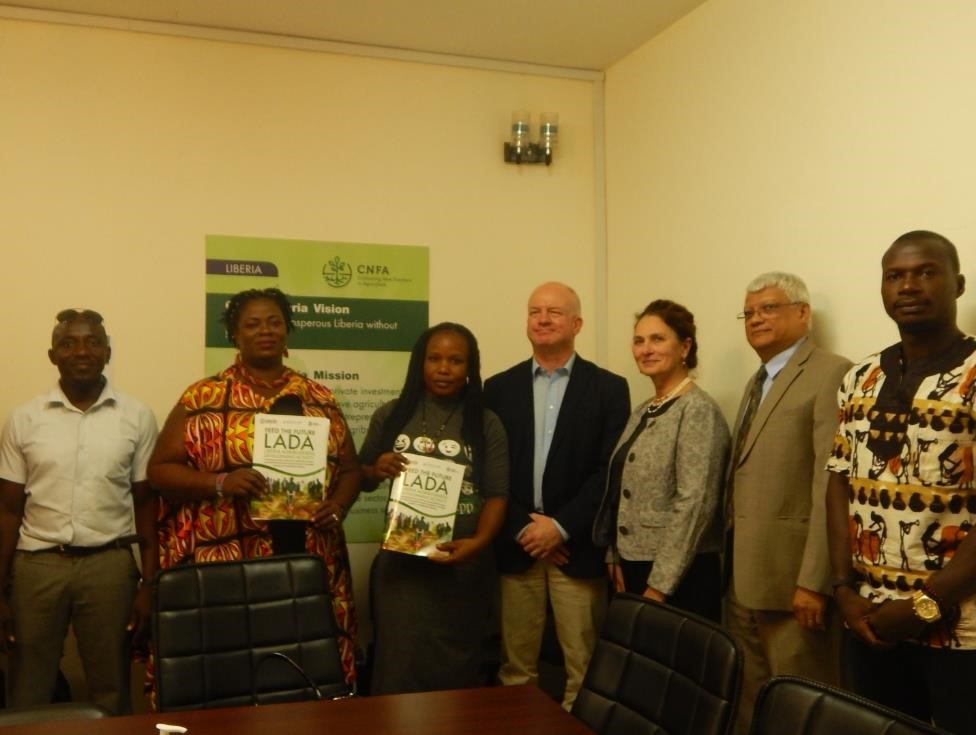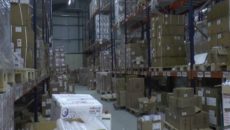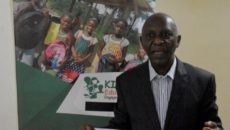MONROVIA, Monrovia – The USAID-funded Feed the Future Liberia Agribusiness Development Activity has signed grant agreements with two local agribusiness organizations.
The initiative was done as part of LADA’s US$ 3 million grant Co-Investment Fund, a mechanism to support agriculture-related businesses in the program’s targeted areas— Lofa, Bong, Nimba and Montserrado.
The fund facilitates private-sector investment in agriculture by providing equity that matches funding that the entrepreneurs put into their businesses.
The grant beneficiaries, Bravo Sisters Enterprise, a local food processor, and Joan Agro-input Dealer, are two Liberian women-owned businesses working with smallholder farmers in the country.
Their selection ensures that the project meets its goal to use 25 percent of its funding to impact qualified women entrepreneurs.
Speaking during the signing ceremony at LADA’s office on Tuesday, LADA’s chief of party, Daniel Gies, said his team was happy to support the development of agro-entrepreneurship in Liberia.
Gies said partners like Joan Agro-input Dealer helps to ensure that agro-inputs coming into the country are safe, inspected, and reasonably priced.
“We work with her as a sitting beneficiary and a network of agro-dealers in particular in order to increase their ability to provide cheap, affordable and high-quality fertilizers, pesticides and seeds to farmers in this country, which is very important,†he said.
“Liberia is large and needs a lot of investment,†Gies said, adding that the co-investment program was meant mainly to encourage others, including banks, investors, and the government to see agriculture as a more attractive investment vehicle.
He said the private sector must drive the process where there are more investment and more production and fewer imports into the country.
“By doing that, then we can ensure that the money people here spend to eat rice, cassava and vegetable goes into the pockets of Liberian farmers, and not Indian, Chinese and Japanese or Pakistani farmers,†Gies said.
The CEO of Bravo Sisters Enterprise, Wedour David, said she was pleased with the support her business has received through the partnership with LADA. Her company is a local processor of cassava and other food products.
Out of a total business investment plan of US$75,000, David said LADA — through the agreement — will provide a 50 percent matching grant of US$37,500 to her business.
She said she intends to use the funds to purchase processing materials in order to increase her production.
“The major thing on my list now is the flash drier, which we use to dry the cassava product — turning it into high-quality cassava flour, fufu powder that is really in demand, and also using it to reserve cassava chips during the rainy season,†David said.
Her organization is also carrying out secondary processing on raw and finished products of more than 480 farmers it has signed agreements with.
Bravo Sisters’ general manager, Mongar David, said the relationship with LADA has increased the business’s capacity.
“The grant will help us increase our production and employ more Liberians,†Mongar David said.
Joan Williams of Joan Agro-input Dealer, whose business is getting US$5,000, said she would use the grant to import more high-quality, cheaper and affordable seeds, fertilizers and pesticides that would improve farmers’ productivity.
She praised LADA for the support and promised to reach out to more farmers. “I feel very proud about this support to my business,†she said.
The LADA initiative, which is operated by Cultivating New Frontiers in Agriculture, aims to increase the agricultural income of smallholder farmers through investments in the agribusiness sector in four counties over the period of five years.
With a fund of US$20 million, the project is expected to achieve its goal by expanding farmers’ access to the market by boosting post-harvest handling, processing, packaging, and marketing services.
Featured photo by Gbatemah Senah
EDITOR’S NOTE: A previous headline had an incorrect figure for the total amount of grant being provided by LADA. That amount has been corrected to reflect US$42,500.





